英语新闻标题及其翻译
英语新闻标题及其翻译
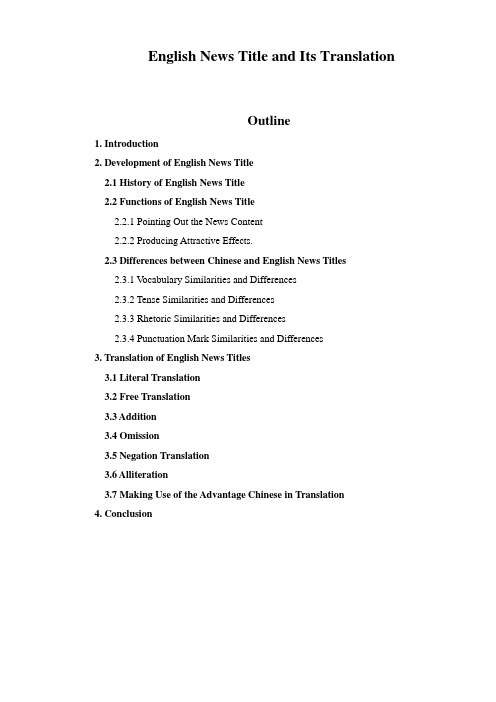
Outline1. Introduction2. Development of English News Title2.1 History of English News Title2.2 Functions of English News Title2.2.1 Pointing Out the News Content2.2.2 Producing Attractive Effects.2.3 Differences between Chinese and English News Titles2.3.1 V ocabulary Similarities and Differences2.3.2 Tense Similarities and Differences2.3.3 Rhetoric Similarities and Differences2.3.4 Punctuation Mark Similarities and Differences3. Translation of English News Titles3.1 Literal Translation3.2 Free Translation3.3 Addition3.4 Omission3.5 Negation Translation3.6 Alliteration3.7 Making Use of the Advantage Chinese in Translation4. Conclusion[Abstract] English news titles play a special role in news reporting. Thus we should place special emphasis on the research of the characteristics and translation of English news titles. This thesis focuses on the study of English news titles in terms of their grammatical features and its translation. When it comes to translation, it tries to reproduce the functions of English news titles which requires translators’ agility and ingenuity in applying semantic and rhetorical devices. With grammatical and semantic exploration into the English news titles, such studies strive to benefit the readers in their understanding of what the editor wants to convey.[Key words] English news title; function; comparison; translations methods英语新闻标题及其翻译[摘要]标题在新闻报道中具有独特的地位。
新闻英语标题翻译与欣赏
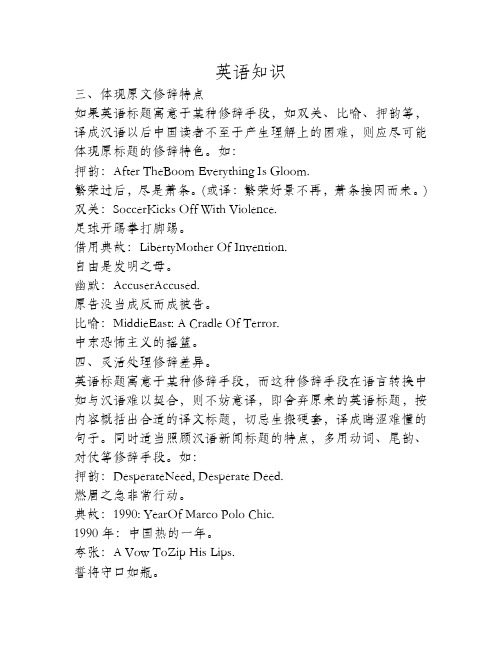
英语知识三、体现原文修辞特点如果英语标题寓意于某种修辞手段,如双关、比喻、押韵等,译成汉语以后中国读者不至于产生理解上的困难,则应尽可能体现原标题的修辞特色。
如:押韵:After TheBoom Everything Is Gloom.繁荣过后,尽是萧条。
(或译:繁荣好景不再,萧条接因而来。
) 双关:SoccerKicks Off With Violence.足球开踢拳打脚踢。
借用典故:LibertyMother Of Invention.自由是发明之母。
幽默:AccuserAccused.原告没当成反而成被告。
比喻:MiddieEast: A Cradle Of Terror.中东恐怖主义的摇篮。
四、灵活处理修辞差异。
英语标题寓意于某种修辞手段,而这种修辞手段在语言转换中如与汉语难以契合,则不妨意译,即舍弃原来的英语标题,按内容概括出合适的译文标题,切忌生搬硬套,译成晦涩难懂的句子。
同时适当照顾汉语新闻标题的特点,多用动词、尾韵、对仗等修辞手段。
如:押韵:DesperateNeed, Desperate Deed.燃眉之急非常行动。
典故:1990: YearOf Marco Polo Chic.1990年:中国热的一年。
夸张:A Vow ToZip His Lips.誓将守口如瓶。
双关:'Silent'Office Workers Demand To Be Heard.“不闻不问”的办公室员工今后将不再不闻不问了。
比喻:RussianReform Old Wine In New Bottle.俄罗斯改革新瓶装陈酒。
可见,要译好英语新闻标题,除了需要透彻地理解原文内涵,领悟其妙处外,还要善于比较研究英汉两种语言新闻标题的特点,充分发挥汉语的优势。
作为一个会议口译译员,应该全面发展,不仅能搞同声传译工作,也要能搞即席传译工作,二者缺一不可。
由于同声传译比即席传译更加容易学习和掌握(这点恐怕同很多人的想象相反),所以,作为初学者,在掌握即席传译技术以前,最好先搞一段时间的同声传译工作。
英语新闻标题修辞赏析与翻译
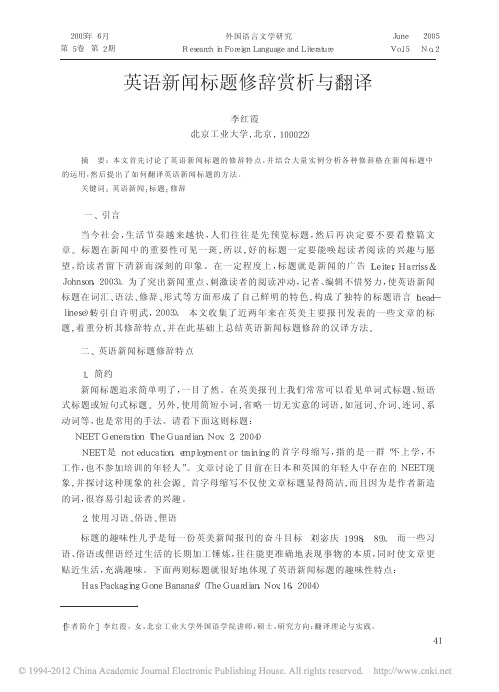
!!2005年6月!!!!!!!!!!!!!!!!!!!!!!!!!外国语言文学研究!June2005第5卷第2期!!ResearchinForeignLanguageandLiterature!Vol.5No.2英语新闻标题修辞赏析与翻译李红霞(北京工业大学,北京,100022)摘要:本文首先讨论了英语新闻标题的修辞特点,并结合大量实例分析各种修辞格在新闻标题中的运用,然后提出了如何翻译英语新闻标题的方法。
关键词:英语新闻;标题;修辞!一、引言当今社会,生活节奏越来越快,人们往往是先预览标题,然后再决定要不要看整篇文章。
标题在新闻中的重要性可见一斑,所以,好的标题一定要能唤起读者阅读的兴趣与愿望,给读者留下清新而深刻的印象。
在一定程度上,标题就是新闻的广告(Leiter,Harriss&Johnson,2003)。
为了突出新闻重点、刺激读者的阅读冲动,记者、编辑不惜努力,使英语新闻标题在词汇、语法、修辞、形式等方面形成了自己鲜明的特色,构成了独特的标题语言(head-linese)(转引自许明武,2003)。
本文收集了近两年来在英美主要报刊发表的一些文章的标题,着重分析其修辞特点,并在此基础上总结英语新闻标题修辞的汉译方法。
二、英语新闻标题修辞特点1.简约新闻标题追求简单明了,一目了然。
在英美报刊上我们常常可以看见单词式标题、短语式标题或短句式标题。
另外,使用简短小词,省略一切无实意的词语,如冠词、介词、连词、系动词等,也是常用的手法。
请看下面这则标题:NEETGeneration(TheGuardian,Nov.2,2004)NEET是noteducation,employmentortraining的首字母缩写,指的是一群“不上学,不工作,也不参加培训的年轻人”。
文章讨论了目前在日本和英国的年轻人中存在的NEET现象,并探讨这种现象的社会源。
首字母缩写不仅使文章标题显得简洁,而且因为是作者新造的词,很容易引起读者的兴趣。
英语新闻标题的特点及翻译
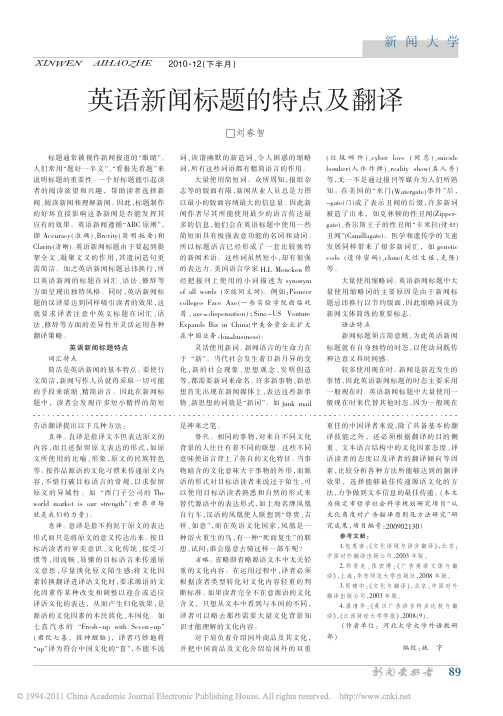
是神来之笔。 替代。 相同的事物,对来自不同文化
背景的人往往有着不同的联想。 这些不同 意味使语言背上了各自的文化特征。 当事 物暗含的文化意味大于事物的外形,而源 语的形式对目标语读者来说过于陌生,可 以使用目标语读者熟悉和自然的形式来 替代源语中的表达形式,如上海名牌凤凰 自行车,汉语的凤凰使人联想到“尊贵、吉 祥 、如 意 ”, 而 在 英 语 文 化 国 家 , 凤 凰 是 一 种浴火重生的鸟,有一种“死而复生”的联 想,试问:谁会愿意去骑这样一部车呢?
修辞特点 英语新闻标题在简洁的原则下追求 吸引力,而修辞恰好是达到此目的的一个 重要手段。 英语新闻标题中常出现的修辞 主要有: 各种修辞格。 修辞种类繁多,英语标题 中常使用的有比喻、头韵、对比、借代、讽 刺、双关、重复、夸张等修辞格。 例如《Pei’s Pyramids Puzzle Paris》(《贝 氏 的 金 字 塔 使 巴黎困惑不解》),这是《时代》周刊报道巴黎 卢浮宫的扩建和改建的一篇文章的标题, 此项工程选择了著名建筑师、 美籍华人贝 聿铭(I. M. Pei )的设计方案,其中有一组构 思奇特、匠心独运的金字塔。 这篇文章标题 里 的 四 个 词 都 以 “p”开 头 形 成 头 韵 ,作 者 标 题的灵感很可能来自“贝氏”(Pei)、“金字塔” (pyramids)、“巴黎”(Paris)这 三 个 词 ,而 作 者 的 匠 心 表 现 在 他 所 选 用 的 “puzzle”一 词 ,它 不仅使标题构成了头韵, 而且表现出贝氏 作品的惊人程度。
参考文献: 1.包 惠 南 :《文 化 语 境 与 语 言 翻 译 》,北 京 : 中国对外翻译出版公司,2003 年版。 2.郭 贵 龙 、 张 宏 博 : 《 广 告 英 语 文 体 与 翻 译》,上海:华东师范大学出版社,2008 年版。 3.郭 建 中 :《文 化 与 翻 译 》,北 京 :中 国 对 外 翻译出版公司,2003 年版。 4.潘 清 华 :《英 汉 广 告 语 言 特 点 比 较 与 翻 译 》,《 江 西 财 经 大 学 学 报 》,2008(9)。 (作者单位: 河北大学大。 直译是指译文不但表达原文的
英语新闻十篇+词汇+短语+翻译

【新闻一】欧洲杯期间谨防足球流氓原文British football supporters have a particularly bad reputation so much so nine crimes that only applied to the sport have been enforced. Elsa Ali finds find out why fans are given the red card. Scenes like these are not uncommon during football matches. Despite British football fans and hooliganism being considered synonymous abroad, fans here say that the troublemakers are few and because of them, that fans are all being treated like criminals. The sort of numbers that we're dealing with here 38 million people were attending football matches last season,and there were eighteen hundred and seventy arrests that sort of all that's a tiny tiny number. So most football matches are trouble-free,arrest free. There's a few bad apples they need to be targeted, but the behavior of fans is good. There are nine football-only crimes which wouldn't be considered a criminal offence if committed anywhere outside of a football stadium. They include encroaching on the pitch,drinking in view of the pitch or even reselling or giving away a ticket. And if those weren't enough, fans are also subjected to special powers. Football banning orders can impose restrictions such as not going within three miles of a football stadium on match days. Requirements to report to the police station at designated times or even surrendering your passport when your club or country are playing abroad. But The Home Office told us evidence shows the legislation has proved effective. Levels of football disorder have been significantly reduced since the introduction of football banning orders in 2000. But the policing is always proportional. Some fans feel like they're being unfairly targeted by government legislation forced by police forces up and down the country. We're here in Millwall whose supporters say they're routinely harassed by the authorities week in week out. Sometimes it starts before the trouble starts you know. They're trying to keep people in check sometimes it can cause more alceration. I have a lot of respect for the police. Because they have a lot of tough job to do in these day. It's not their fault. Sometimes they're told what to do by other people. At the end of the day, people are just trying to watch a football game. And I think we gave more than most things. Indeed several of the Millwall fans that we spoke to concede that they have a bad reputation. It was their supporters we saw at the beginning of the piece fighting with Barnsley fans during the recent League One play-off final at Wembley. But what if the police start arresting people for slightly less a crimes. As we were celebrating, I got pulled out a crowd and you know I was arrested for common assault. Many football fans might have a problem sinking their teeth into laws being used for seemingly bizarre charges. But it's a tough time for police aroundfootball supporters after the recent hillsboro ruling and worries about terrorism are heightened as the Euro Tournament kicks off in France this week. There is no doubt there will be on the highest alert. so maybe leave the inflatable sharks at home. Elsa Ali London.翻译英国球迷风可谓臭名昭著,执法部门对此制定了九项足球犯罪。
双语新闻版块

双语新闻版块
在双语新闻版块中,您可以看到中英文对照的新闻报道,帮助您更好地理解新闻内容,同时提高您的英语阅读能力。
以下是部分双语新闻标题:
1.“We will always be friends”: Biden and Trump finally part ways
“我们永远是朋友”:拜登和特朗普最终分道扬镳
2.The COVID-19 pandemic has killed more than 2 million people worldwide
新冠肺炎疫情已造成全球200多万人死亡
3.China's first homegrown passenger jet, the C919, takes its maiden flight
中国首款国产客机C919首飞成功
introduces strict new measures to curb spread of new coronavirus
variant
英国推出严格新措施遏制新冠病毒变异株传播
Capitol riots: What we know about the pro-Trump mob that stormed
Congress
美国国会大厦暴乱:关于冲击国会的特朗普支持者群体我们知道的情况。
英语新闻标题的特点及其汉译
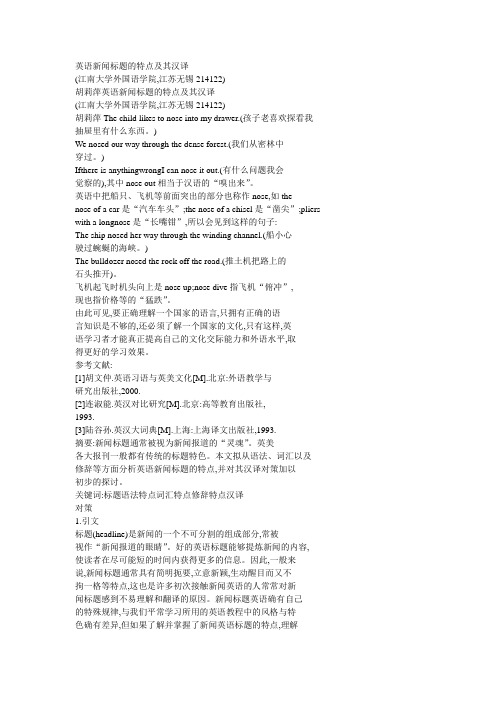
英语新闻标题的特点及其汉译(江南大学外国语学院,江苏无锡214122)胡莉萍英语新闻标题的特点及其汉译(江南大学外国语学院,江苏无锡214122)胡莉萍The child likes to nose into my drawer.(孩子老喜欢探看我抽屉里有什么东西。
)We nosed our way through the dense forest.(我们从密林中穿过。
)Ifthere is anythingwrongI can nose it out.(有什么问题我会觉察的),其中nose out相当于汉语的“嗅出来”。
英语中把船只、飞机等前面突出的部分也称作nose,如thenose of a car是“汽车车头”;the nose of a chisel是“凿尖”;pliers with a longnose是“长嘴钳”,所以会见到这样的句子:The ship nosed her way through the winding channel.(船小心驶过蜿蜒的海峡。
)The bulldozer nosed the rock off the road.(推土机把路上的石头推开)。
飞机起飞时机头向上是nose up;nose dive指飞机“俯冲”,现也指价格等的“猛跌”。
由此可见,要正确理解一个国家的语言,只拥有正确的语言知识是不够的,还必须了解一个国家的文化,只有这样,英语学习者才能真正提高自己的文化交际能力和外语水平,取得更好的学习效果。
参考文献:[1]胡文仲.英语习语与英美文化[M].北京:外语教学与研究出版社,2000.[2]连淑能.英汉对比研究[M].北京:高等教育出版社,1993.[3]陆谷孙.英汉大词典[M].上海:上海译文出版社,1993.摘要:新闻标题通常被视为新闻报道的“灵魂”。
英美各大报刊一般都有传统的标题特色。
本文拟从语法、词汇以及修辞等方面分析英语新闻标题的特点,并对其汉译对策加以初步的探讨。
英语新闻标题特点及翻译
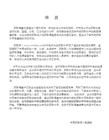
Chrome- plated Independence 电镀的独立( 讽刺的使用, 在每年铬出口量只有80 吨的某小国家, 有人扬言要“完全自力更生”, 使用讽刺的标题发人深省, 意味隽永)
Spirit Valentine' s Day Can Last All Year 一年四季情人节( 基本直译)
Putin Faces Harsh Press Criticism Over Terror普京因恐怖事件受媒体严厉批评( 直译)
When It Comes To Romance, Listen To Your Friends 爱河泛舟, 求教朋友( 基本直译)
2.2 语态
读者在广泛接触英语报刊时, 一定会发现新闻标题使用主动语态的频率远远高于被动语态。而即使在使用被动语态时, 被动语态的“be”也常常被省略, 只留下过去分词, 也不用“by”来引出动作的执行者, 例如:
Girl of 18 Raped After Threat With Bread Knife 餐刀威逼下, 18 岁少女遭强暴
Love For Labor Lost? ( Newsweek, Oct.16,2000) 工党失宠了吗? ———英首相布莱尔支持率下降( 设问的使用,能够抓住读者的目光吸引其看个究竟)
Thank Heavens For Brussels 欧盟有救了( 借代的使用, 布鲁塞尔(Brussels)是比利时首都, 欧盟总部所在)Accusers Accused 告人不成, 反被人告( 幽默的使用, 诙谐能引起读者的注意和阅读兴趣)
- 1、下载文档前请自行甄别文档内容的完整性,平台不提供额外的编辑、内容补充、找答案等附加服务。
- 2、"仅部分预览"的文档,不可在线预览部分如存在完整性等问题,可反馈申请退款(可完整预览的文档不适用该条件!)。
- 3、如文档侵犯您的权益,请联系客服反馈,我们会尽快为您处理(人工客服工作时间:9:00-18:30)。
Outline1. Introduction2. Development of English News Title2.1 History of English News Title2.2 Functions of English News Title2.2.1 Pointing Out the News Content2.2.2 Producing Attractive Effects.2.3 Differences between Chinese and English News Titles2.3.1 V ocabulary Similarities and Differences2.3.2 Tense Similarities and Differences2.3.3 Rhetoric Similarities and Differences2.3.4 Punctuation Mark Similarities and Differences3. Translation of English News Titles3.1 Literal Translation3.2 Free Translation3.3 Addition3.4 Omission3.5 Negation Translation3.6 Alliteration3.7 Making Use of the Advantage Chinese in Translation4. Conclusion[Abstract] English news titles play a special role in news reporting. Thus we should place special emphasis on the research of the characteristics and translation of English news titles. This thesis focuses on the study of English news titles in terms of their grammatical features and its translation. When it comes to translation, it tries to reproduce the functions of English news titles which requires translators’ agility and ingenuity in applying semantic and rhetorical devices. With grammatical and semantic exploration into the English news titles, such studies strive to benefit the readers in their understanding of what the editor wants to convey.[Key words] English news title; function; comparison; translations methods英语新闻标题及其翻译[摘要]标题在新闻报道中具有独特的地位。
因此在整个新闻英语翻译中标题翻译的作用不可忽视。
本文拟从以下角度进行论证:英文报刊标题的文字简练醒目,无疑是来源于对英语语法得心应手的灵活运用。
而要再现英文标题在原文中所起的浓缩主题、画龙点睛的作用,需要译者同样在用词和修辞等语法方面匠心独运。
本文拟通过对英语新闻标题翻译原则和策略的探讨,以期能对新闻英语包括英语标题翻译找到一条具有特定翻译规则的途径作出有益的尝试。
[关键词] 英语新闻标题; 作用; 分类; 对比; 翻译方法1 IntroductionWhat is the title? A title of a piece of news usually printed in large type and devised to summarize, gives essential information, or interests readers in reading the news content . Naturally readers buy newspapers in order to keep posted on daily happenings. However, t oday’s English newspapers are getting fatter with a greatnumber of pages. Therefore, many readers have formed the habit of scanning titles, which makes possible rapid news comprehension. Thus one of the most important purposes of titles is to inform readers quickly, which means that a well-designed title immediately tells them the gist of the accompanying story. Nothing is more important than packaging the product. A piece of news and its titles resemble the product and the packaging respectively. Only when the titles grasp the attention of the readers, the whole page can obtain vitality. So we say a final requirement of titles is to stimulate the reader’s artistic sense.Therefore, news people need to make sure that English title forms are set to beautify the layout of the newspaper and thus to interest readers in the stories.2. Development of English News Title2.1 History of English News TitleThe history of English news title is long and it can be divided into three phases. English news titles were originated in the Qing Dynasty. The characteristic of embryo is long and complex. The second stage of news title begins with the characteristic of diversity in the 19th century 70's. The third stage is from 20th century to nowadays and has the feature of concise and simplicity. In a word, the translation of English news title experienced the process from complexity to simplicity.2.2 Functions of English News TitleThe news title is the fundament al part of any piece of news. In a time when it’s harder to get people’s attention, good writers always spend too much time and creative energy working on their titles, because they know that the title is one of the most important parts of their work. According to Bruce H. Westley, from the standpoint of the reader, newspaper titles serve the following purposes:2.2.1 Pointing Out the News ContentNews titles summarize the news content, so the news content can be reflected by the titles alone. By glancing over them, the readers will know what the story is about. Readers can quickly locate the parts that interest him mostly by following the sequence of the news points line by line. Titles rank the importance of stories by the size of the print and placement on the page. And titles can convey the relative significance of the news.2.2.2 Producing Attractive EffectsNews titles are essential to attract the re ader’s attention. General speaking, two methods are used. First, the consistent use of familiar title structure gives the newspaper a relatively familiar and welcome nature. Secondly, English news title is trying to make good use of the front page of a newspaper, especially in electronic media. All of that can help attract the public’s attention. The front page plays the most important role of attracting the eyeballs of the readers well. Since newspapers are usually sold on the newsstands with just the top-half of the paper showing to the passengers, reporters of newspapers try every means to make the banner titles across the top of the page attractive enough to be a crowd-stopper (Westley 1972).2.3 Differences between Chinese and English News TitlesUnderstanding the similarities and differences between the Chinese and English news titles are carrying on the accurate translation. Any thing has its general character and its individuality. The Chinese and English news title is not exceptional. Directness and factuality are the two most prominent general characters. But the different language cultural context and the news tradition enable the Chinese and English title to have their own clear characteristics.2.3.1 Vocabulary Similarities and DifferencesIn most cases both English titles and Chinese titles share similarities in the vocabulary usage. First, in the news titles they both use shrinks and concise words (In Chinese we often used “armed police”,“Political Consultative Conference”,“WTO”,“Security Council”and so on. In English UN, UK, USA, NATO, WTO, NASA EU) “Minor term” is the popular word usage and t he fashionable word usage in English news titles. Second, both enjoy using popular words. Third, both enjoy using stylish words. For example:(1) 全球瞩目A股巨震,暴跌难阻股民入市热情(2) MP demands probe into MoD bungles (MP=Member of Parliament; MoD=ministry ofDefense(3) 越来越多的人在聚会时喜欢“k歌”(K song is stylish word)(4) American Online; Often Down, Never Out (Online is stylish word)The first two examples use the popular terms and the last two ones use the stylish word.Differences:Judging from vocabulary, the Chinese news title is fond of using several verbs together, but the English news title is fond of using several noun words together. English news often uses short words and some initials or acronyms which are printed in large type, Such as EEC short for European Economic Community.(5) 开放搞活改革致富(6) Britain “Flagship” Detention Center Abandoned(7) 武船再助“神舟”飞天(“武船”指武昌造船厂)(8) A 2nd LI Priest Removed (LI=Long Island)The first example shows Chinese title uses four verbs together, while the second one shows English title uses four nouns together. That’s the difference lying in the Chinese and English news title in the vocabulary usage.2.3.2 Tense Similarities and DifferencesEnglish and Chinese news titles all massively use the phrase title. In Chinese we commonly use verb-object phrase, noun phrase and so on. In English we commonly use non-localization minor sentence (for example participial phrase, Infinitive phrase and gerund phrase), adjective phrase, and preposition phrase and so on. Translation may happen according to respective characteristic transformation. E.g.(9) Five Ways to Be Romantic(10) Helping the Homeless to Help Themselves(11) US carmakers ready to cut output.(12) 走向美好明天的江西.(13) 变化中的股市(14) 中国与发展In the above English news titles, the first uses the infinitive phrase, the second uses the gerund phrase and the third uses the adjective phrase. In the Chinese news titles, the first uses two verb-object, the last one uses noun -verb.When we read English news title we will find English news titles often use simple present tense, present progressive tense and simple future tense, whose sign is obvious. However, you will find Chinese news titles often use present tense and progressive tense. Who tense sign is not obvious (Peter, Newmark 2001).For example:(15) French Culture Is the Doldrums法国文化颓然不振(16) China is growing strong.中国正在发展壮大.(17) China had an earth-shaking change.中国发生了一个翻天覆地的变化(18) 中国自然资源丰富.(19) 总理会见了受难群众(20) 中国法律将更加完善.(21) 圆满取得了成功.From the above examples we can find the first four examples use general present tense, general future tense, and present progressive tense, general past tense individually, and have obvious tense signs. The last ones use general present tense, the present tense replace past tense, future tense, past tense. But they have no obvious tense signs.2.3.3 Rhetoric Similarities and DifferencesBoth English and Chinese news title use the ordinary rhetoric, such as metaphor and hyperbole. It can attract more readers and make the news more clear and colorful.(22) Dam work brings flood of debate(23) 孩子是祖国的花朵(24) Graying Armies March to Defend Social Security(25) 一落千丈The first and second examples use the metaphor. The rest uses the hyperbole. The above two kinds of rhetoric are often used in English and Chinese news titles.As for the rhetoric, English-Chinese news title style is respectively different. The Chinese news title highly values a literary talent especial in antithesis and controls rhyme. The English news title is insipid and pays more attention to the fact. The usage of rhetoric lattice is limited. It often uses literary quotation, allegory, personification, harmonic tone, alliteration, repetition, word or phrase with double meaning, changing the order of rhetoric. Chinese news titles often use parallelism, overlapping, swing, aphorism, antithesis, comparison, word or phrase with double meanings. Some rhetoric is respectively for English institute such as alliteration and swings.(26) Protestant Protest(27) Grammy Apple of New York’s Eye?(28) The Scent of Descent(29) 名言草,实言人。
